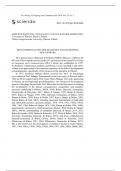Psychology of Language and Communication 2020, Vol. 24, No. 1
DOI: 10.2478/plc-2020-0004
MARLENA BARTCZAK1, EWA HAMAN1, NATALIA BANASIK-JEMIELNIAK2
1
University of Warsaw, Warsaw, Poland
2
Maria Grzegorzewska University, Warsaw, Poland
DEVELOPMENTAL PSYCHOLINGUISTICS: OLD QUESTIONS,
NEW ANSWERS
This special issue is dedicated to Professor Barbara Bokus to celebrate the
40th year of her scientific activity and the 20th anniversary of the journal Psychology
of Language and Communication (PLC), which she established in 1997.
As Barbara’s collaborators, students, and friends, we have decided to edit a PLC
volume as an appreciation of her immense importance in the field of developmental
psycholinguistics, specifically of the advances of the discipline in Poland.
In 1977, Professor Barbara Bokus received her M.A. in Psychology
(as a student of Prof. Tadeusz Tomaszewski) at the University of Warsaw, and in
1982 her Ph.D. (supervised by Prof. Grace Wales Shugar). Her work, pioneering
in Poland, on developmental psycholinguistics, was devoted to the pragmatic
aspects of language. In particular, Prof. Bokus has devoted her career to studying
the development of the human communicative competence and cognitive
processes underlying it (Bokus, 2005b, 2010; Bokus, Bartczak, Szymańska,
Chronowska, & Ważyńska, 2017; Bokus & Haman, 1992; Bokus & Hernik,
2015; Bokus & Shugar, 1985, 1986; Bartczak, Szymańska, & Bokus, 2010;
Haman & Bokus, 2002; Kurcz & Bokus, 1987; Kurcz, Shugar, & Bokus, 2002;
Staroń, Bokus, & Kail, 2005), including situational determinants of child-adult
and child-child narrative discourse (Bokus, 1978, 1979, 1981, 1983a, 1983b,
1984, 1985, 1986; Bokus & Shugar 1979, 1984; Shugar & Bokus 1986, 1988),
argumentative discourse in child interactions (Bokus, 2008; Bokus & Shugar,
2007a, 2007b), understanding of metaphors (Bartczak & Bokus, 2013, 2015;
Bokus & Garstka, 2009; Bokus & Kałowski, 2017; Dryll & Bokus, 2016, 2018;
Jaworska, Szymańska, Bartczak, & Bokus, 2016), and irony comprehension
(Banasik-Jemielniak & Bokus, 2019a, 2019b; Bokus & Kałowski, 2016;
Milanowicz & Bokus, 2011, 2020; Milanowicz, Tarnowski, & Bokus, 2017).
She is also known for her investigation of children’s narrative stories (Bokus,
1987, 1989, 1991a, 1991b, 1992a, 1992b, 1996, 1997, 1998, 2000a, 2000b, 2001,
, 71 MARLENA BARTCZAK, EWA HAMAN, NATALIA BANASIK-JEMIELNIAK
2003a, 2003b, 2004, 2005a, 2009, 2011b, 2011c, 2013a; Bokus & Shugar 1995,
1996, 1998; Bokus, Więcko, & Zamęcka, 1992).
In her work, she has taken an interdisciplinary perspective, bridging
multiple fields within humanities and social sciences. Her work goes beyond
psycholinguistics and serves to elucidate topics such as responsibility, doubt,
situation, truth, and falsity, among others (Bokus, 2013b; Bokus & Cieślik, 2006;
Bokus & Kloch, 2013; Bokus & Kossowska, 2015, 2016, 2020; Gomóła & Bokus,
2017a, 2017b; Kossowska & Bokus, 2015, 2016; Latawiec, Latawiec, & Bokus,
2016; Milanowicz & Bokus, 2013; Płońska & Bokus, 2010; Shugar, Bokus,
& Smogorzewska, 2013; Ważyńska, Szymańska, Bartczak, Bokus, 2015).
She has devoted a lot of attention to Tomaszewski’s theory of action,
analyzing its fundamental concepts in the context of studies on cognitive
development (Bokus, 2011a, 2016; Bokus & Kossowska, 2018). Throughout her
career, she has also been organizing and conducting numerous interdisciplinary
conferences, which aimed at the integration of empirical scientists and humanists
around important societal issues. Barbara Bokus was one of the founders of the
Inter-Faculty Individual Studies in the Humanities (MISH) at the University
of Warsaw and heads the Inter-University Program of Interdisciplinary Ph.D.
Studies at the Artes Liberales Academy. Her work has been and continues to
be an inspiration to generations of Ph.D. students and collaborators around the
world, the evidence of which is demonstrated in the current volume.
Barbara Bokus has been for years an excellent tutor, supervisor, mentor, and
collaborator, appreciated and beloved by her students, mentees, and coworkers.
The list of papers in the special issue speaks for itself. The papers are authored by
former students and collaborators of Barbara, who all owe her a lot. Topics of the
articles reflect a wide scope of interest in developmental psycholinguistics and
related fields to which Prof. Bokus also devoted her time and expertise.
References:
Banasik-Jemielniak, N., & Bokus, B. (2019a). Children’s comprehension of
irony: Studies on Polish-speaking preschoolers. Journal of Psycholinguistic
Research, 48, 1217–1240. doi:10.1007/s10936-019-09654-x
Banasik-Jemielniak, N., & Bokus, B. (2019b). Jak dzieci w wieku przedszkolnym
uzasadniają użycie języka figuratywnego. Dane z badań z zastosowaniem
Zadania Rozumienia Ironii (ZRI). Psychologia Wychowawcza, 57(15), 7-37.
doi:10.5604/01.3001.0013.2960
Bartczak, M., & Bokus, B. (2013). Rozumienie pojęć w depresji [Understanding
of notions in depression]. Piaseczno: Studio Lexem.
Bartczak, M., & Bokus, B. (2015). Cognitive representations (metaphorical
conceptualizations) of PAST, FUTURE, JOY, SADNESS and HAPPINESS
in depressive and non-depressive subjects: Cognitive distortions in
depression at the level of notion. Journal of Psycholinguistic Research, 44,
159–185. doi:10.1007/s10936 014-9286-6





